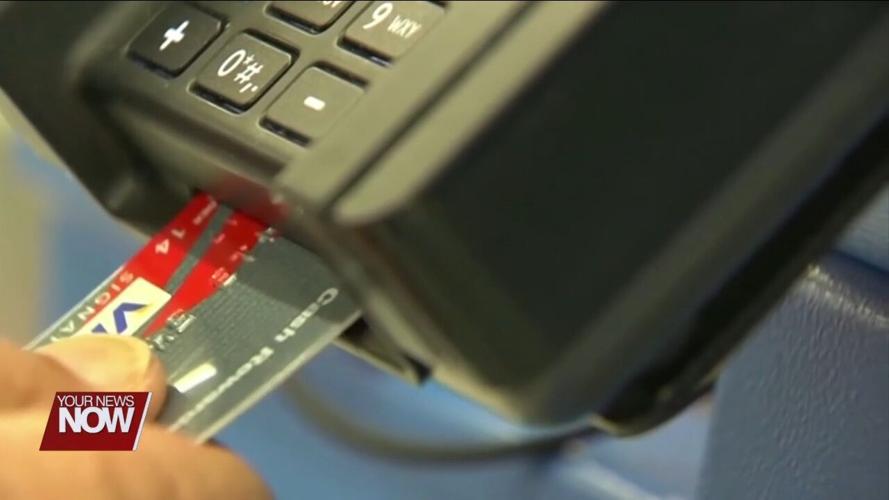OHIO (WLIO) - The holidays are over, and now it is time for the "Santa Shock," when you get the bills for all of your purchases.
According to a study conducted by Lending Tree, consumers, on average, incurred a holiday debt of nearly $1,200. The Ohio Division of Financial Institutions tips to reduce your large bill are negotiating a lower interest rate, creating a debt payoff plan, or reducing your spending for normal monthly expenses. Experts say you don't want this year's holiday debt to spread to next year.

According to a study conducted by Lending Tree, consumers, on average, incurred a holiday debt of nearly $1,200.
"The one thing that you don't want is large credit card balances because that is the highest interest rate you can pay. Ideally, you would have no debt, but most people have to carry some debt. So, if you end up with credit card balances that are high. If you have a home equity line of credit, you can pay them off with that, and you can be going from 18% to 8%, and that is a significant drop in interest rates, and you will pay less over time," says Rob Rotkowski, Deputy Superintendent, Ohio Division of Financial Institutions.
When you get your credit card bill, don't just focus on the amount; review your charges to make sure there wasn't anything out of the ordinary. If there is, call your credit card company immediately.
"The first thing you do is call the issuer to 'STOP, BLOCK, & REISSUE' is what the standard method that credit companies use to deal with this," adds Rotkowski.

When you get your credit card bill, don't just focus on the amount; review your charges to make sure there wasn't anything out of the ordinary.
According to Experian, there were 214 thousand cases of credit card fraud reported in just the first half of last year. So, it is important to review your charges and update your passwords regularly to help prevent fraud of your card.
Division of Financial Institutions shares tips to address large holiday credit card bills and compromised credit cards.
January 7, 2025, press release from the Ohio Department of Commerce Division of Financial Institutions (DFI): COLUMBUS, Ohio – As Ohioans await credit card bills from the recent holiday season, the Ohio Department of Commerce Division of Financial Institutions (DFI) is sharing tips to help consumers work through any post-holiday financial headaches, whether it’s managing surprisingly large invoices or dealing with potentially stolen credit cards.
The National Retail Federation reported late last year that sales during the 2024 holiday season were expected to reach a new record. At the same time, according to a survey conducted by LendingTree, 36% of American consumers were expected to incur holiday debt with an average balance of $1,181, which is up from $1,028 in 2023.
DFI Superintendent Kevin Allard says the combination of spending more and going into debt can lead to an increased risk of carrying balances into the next holiday season, which can cause even greater financial pressure for consumers.
“Although they’re quite common in January, larger-than-expected bills after the holidays can seem overwhelming and, at times, insurmountable,” Allard said. “It’s important for consumers to take a breath and realize there are steps they can take to address this financial challenge in the short term so their overall long-term financial outlook isn’t negatively impacted.”
To help manage holiday debt, Ohioans may consider taking the following steps if they receive a large bill:
- Negotiate a lower interest rate – Contact your creditors and emphasize your history of on-time payments or cite competitive offers from other companies. A single phone call could result in significant savings.
- Consider participating in a no-spend month – Offset holiday expenses by challenging yourself to limit spending to only necessities like housing, transportation, and groceries for an entire month.
- Create a debt payoff plan – Don’t panic if you are unable to pay off all your holiday spending immediately. Instead, develop a realistic plan that will allow you to pay it off as soon as possible. Just as important, make sure to stick to this plan.
When you receive your credit card bills in the mail, don’t focus on just the amount you owe. Instead, review each expense to ensure there isn’t anything out of the ordinary that may have driven up your bill up any higher than it should be.
According to Experian, credit card fraud remains a significant issue, with over 214,000 cases reported in the first half of 2024. If you believe your credit or debit card might have been compromised during the holiday season, DFI recommends taking the following steps:
- Cancel your card – Contact your card issuer or bank immediately to cancel the card and request a replacement. For debit cards, make sure to also update your PIN.
- Monitor your accounts – Regularly check statements and online activity for unauthorized transactions. If you notice any disputes or suspicious charges, report them immediately.
- Change passwords – Update your passwords for any accounts that may have been compromised, and also be sure to update your login credentials. Consider freezing your credit to prevent unauthorized new accounts from being created.
- Report the issue – Report stolen information to the Federal Trade Commission at identitytheft.gov for additional support.
“We want Ohioans to feel empowered to take control of their financial future,” Allard said. “Whether it’s addressing holiday debt or protecting against fraud, taking a combination of both appropriate reactive and proactive steps can help you achieve greater financial stability.”
For more information and resources on financial health, fraud prevention, and credit improvement, visit DFI’s website.


